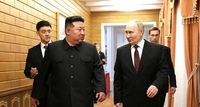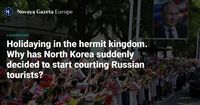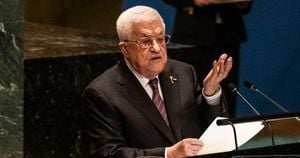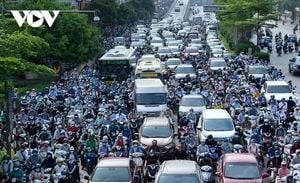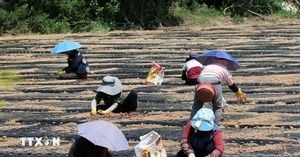North Korea, long known for its secrecy and isolation, is making a calculated gamble: opening its doors—though only slightly—to Russian tourists in a bid to refill its depleted coffers with much-needed foreign currency. After four years of pandemic-induced closure to foreign visitors, the secretive regime has shifted its focus from its once-lucrative Chinese tourism market to its ideological ally, Russia, as new travel patterns and geopolitical realities reshape the region.
In late July 2025, Russian budget carrier Nordwind Airlines launched the first non-stop commercial flight from Moscow to Pyongyang since the 1990s, carrying what Russian media claimed were more than 400 passengers. According to Kyiv Post, this new monthly route marks a historic re-connection between two pariah capitals, coming just weeks after North Korean leader Kim Jong Un personally unveiled a new, state-of-the-art beach resort in the Wonsan-Kalma Coastal Tourist Area at the end of June.
The fanfare, however, was short-lived. Within a week of the resort’s unveiling, North Korea imposed a blanket ban on all foreign visitors—except Russians. In mid-July, 15 Russians, including journalists and travel influencers, were granted privileged access to Pyongyang and Wonsan, escorted at all times by government minders determined to show only the regime’s best face. As Novaya Gazeta Europe reported, these visitors were shielded from the country’s chronic food shortages, infamous labor camps, and any hint of its nuclear facilities. Their itinerary was strictly curated, and their impressions, at least in public, were glowing.
Russian Foreign Minister Sergey Lavrov, during his own visit to Wonsan in July, didn’t miss the chance to encourage his compatriots to holiday at the new seaside complex—a gesture of goodwill reciprocating North Korea’s robust support for Russia’s war effort in Ukraine. Over the past two years, Pyongyang has supplied up to 40% of the ammunition used by Russian forces and even deployed around 14,000 troops to bolster Moscow’s military campaign, as detailed by Kyiv Post.
Yet, North Korea’s embrace of Russian tourists is more than a simple economic calculation. For Kim Jong Un’s regime, tourism has always been a double-edged sword. Bespoke tour packages sold through state-owned agencies can funnel precious hard currency into the hands of the elite, but the risk of foreign visitors—especially from the West—importing ideas that challenge the regime’s tightly controlled narrative is ever-present. The tragic story of American college student Otto Warmbier still looms large. Detained in 2016 for allegedly stealing a propaganda poster, Warmbier was sentenced to 15 years of hard labor; he fell into a coma in custody and died shortly after his release to the United States, sparking outrage and highlighting the perils of Western tourism in North Korea.
“For the sake of averting such PR disasters, the North Korean government likely concluded that hosting Russian visitors is a much safer bet, given their conformist nature and disinclination to deviate from officially accepted behavior in a society where the stakes for independent thinking or open discourse could not be higher,” Kyiv Post observed. Russian tourists, facing mounting restrictions and limited options abroad due to their own country’s pariah status, are seen as unlikely to challenge the regime’s rules or expose its darker realities.
Before the pandemic, North Korea’s tourism industry was overwhelmingly reliant on Chinese visitors—about 300,000 annually, accounting for 90% of foreign tourists, according to both Novaya Gazeta Europe and Kyiv Post. But since the border closures of 2020, travel dynamics in Asia have shifted dramatically. Chinese passport holders now enjoy far easier access to destinations like Japan, South Korea, Thailand, and Malaysia, reducing the appeal of a North Korean holiday—especially given the regime’s repressive reputation.
Russians, by contrast, have found themselves increasingly unwelcome in much of the world. EU member states have debated barring Russian tourists, and many Western destinations have imposed restrictions in response to the war in Ukraine. As a result, Russian travelers have turned to “rogue, heavily embargoed jurisdictions such as Cuba and Iran,” Kyiv Post noted, and now, North Korea is positioning itself as a viable—if unusual—alternative.
North Korea’s new tourism strategy is not just about cash flow. It’s also a geopolitical maneuver. As Novaya Gazeta Europe explained, “leaving Pyongyang’s upper echelons almost exclusively reliant on trade with Moscow to keep their heads above water serves the Kremlin’s long-term interests and allows Putin to accrue that much more leverage over Kim.” In other words, Russia’s growing economic support for North Korea—whether through tourism, trade, or military cooperation—strengthens the Kremlin’s hand in the region and deepens the two countries’ mutual dependence.
The choice of Nordwind Airlines, rather than Russia’s flagship Aeroflot, to operate the new flights is also telling. With Aeroflot hoping to resume direct Moscow-New York service, Russian officials were wary of risking US landing rights by associating the airline with sanctioned North Korea. Nordwind, a budget carrier with less at stake internationally, was a safer bet for this sensitive route.
For the North Korean regime, the benefits are clear: a steady trickle of Russian tourists brings in hard currency without requiring the government to make any concessions on its nuclear program or human rights record. As Novaya Gazeta Europe put it, “the prospect of earning vital hard currency without first having to make any compromises on his nuclear programme or putting up with finger-wagging over his horrific human rights record is too sweet a deal for the North Korea dictator to pass up.”
Still, the regime’s paranoia is never far from the surface. Even Russian tourists are closely monitored, their movements controlled, and their access to the country’s realities strictly limited. The 15 Russians who visited in July were, as Kyiv Post described, on a “myth-busting mission to normalize and whitewash Kim Jong-Un’s gross mismanagement of his personal fiefdom.” Their reports praised Pyongyang’s modern architecture, Wonsan’s pristine beaches, and the local cuisine—while pointedly ignoring the regime’s darker side.
One visitor, Anastasiya Samsonova, told Sky News she saw “nothing terrible” and felt “absolutely free” during her tightly managed tour—a sentiment that, as Kyiv Post wryly noted, “reflects how low a bar Russian tourists set for themselves when venturing abroad.”
Ultimately, North Korea’s new tourism push is a reflection of shifting alliances and survival strategies in a world where both Pyongyang and Moscow are increasingly isolated. For Kim Jong Un, the chance to attract Russian visitors—without risking the ideological contamination that comes with Western tourists—offers a rare opportunity to earn hard currency and strengthen ties with a powerful patron. For Vladimir Putin, meanwhile, propping up North Korea’s economy and deepening people-to-people cooperation is a low-cost way to expand his influence and keep a useful ally close.
As the summer season unfolds, the beaches of Wonsan may not be packed with sun-seekers, but for a select group of Russian tourists—and the leaders who welcome them—the stakes are far higher than a simple holiday. What happens in North Korea’s new era of selective openness will be watched closely, not just by would-be travelers, but by governments and analysts across the globe.
